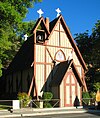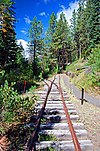National Register of Historic Places listings in Grant County, Oregon
Appearance
(Redirected from National Register of Historic Places in Grant County, Oregon)

This list presents the full set of buildings, structures, objects, sites, or districts designated on the National Register of Historic Places in Grant County, Oregon, United States, and offers brief descriptive information about each of them. The National Register recognizes places of national, state, or local historic significance across the United States.[1] Out of over 90,000 National Register sites nationwide,[2] Oregon is home to over 2,000,[3] and 9 of those are found partially or wholly in Grant County.
This National Park Service list is complete through NPS recent listings posted November 8, 2024.[4]
Current listings
[edit]| [5] | Name on the Register | Image | Date listed[6] | Location | City or town | Description |
|---|---|---|---|---|---|---|
| 1 | Advent Christian Church |  |
June 10, 1992 (#92000665) |
261 W. Main Street 44°24′59″N 118°57′14″W / 44.416499°N 118.954018°W | John Day | Outstandingly rich Victorian style ornamentation was applied to a classically simple Gothic Revival form in this 1900 church. It is believed that lay minister and carpenter Samuel Bayliss Hope was personally responsible for most of the decorative woodwork, including the unusually late use of hand-planed moldings.[7] |
| 2 | James Cant Ranch Historic District |  |
June 21, 1984 (#84003000) |
Along Oregon Route 19 44°33′19″N 119°38′41″W / 44.555278°N 119.644722°W | Dayville | |
| 3 | Fremont Powerhouse |  |
August 19, 1983 (#83002151) |
Umatilla National Forest, along Forest Road 10 44°47′47″N 118°29′52″W / 44.796285°N 118.497718°W | Granite | |
| 4 | John Day Compound, Supervisor's Warehouse |  |
April 11, 1986 (#86000836) |
179–199 Government Road 44°25′07″N 118°57′37″W / 44.418502°N 118.960151°W | John Day | Built by the Civilian Conservation Corps in 1936–1946, this complex is the headquarters for field operations in the Malheur National Forest. It represents that era's shift in the Forest Service's architectural vision toward comprehensive site planning, as well as the Service's policy evolution from custodial superintendence toward active natural resource management.[8] |
| 5 | Kam Wah Chung Company Building |  |
March 20, 1973 (#73001575) |
John Day City Park 44°25′07″N 118°57′25″W / 44.418688°N 118.956922°W | John Day | The best known example of a Chinese mercantile and herb store in the United States. It embodies the role of immigrant Chinese in the post-Civil War expansion period of the western United States.[9] |
| 6 | St. Thomas' Episcopal Church |  |
November 21, 1974 (#74001685) |
135 Washington Street 44°23′17″N 118°56′57″W / 44.388073°N 118.949058°W | Canyon City | |
| 7 | Sumpter Valley Railway Historic District |  |
August 3, 1987 (#87001065) |
Roughly between Baker and Prairie City starting near the McEwen station site and west to the Dixie Pass area (See also Baker County.) 44°32′08″N 118°36′17″W / 44.535617°N 118.604753°W | Prairie City to Baker City | This narrow-gauge railway, built in stages between 1890 and 1910, was intimately connected to the logging industry in the Blue Mountains, and also served the mining, livestock, and agricultural industries. About half of the total roadbed of the railway is included in the historic district, along with several spurs, station sites, sawmill sites, and rolling stock. Although most of the line was abandoned in 1933 and 1946 and rails removed, a small section continues to operate as a heritage railway.[10] |
| 8 | Sumpter Valley Railway Passenger Station |  |
May 5, 1981 (#81000483) |
Main and Bridge Streets 44°27′29″N 118°42′22″W / 44.457970°N 118.706208°W | Prairie City | |
| 9 | Supervisor's House No. 1001 |  |
April 11, 1986 (#86000833) |
Malheur National Forest 44°24′57″N 118°57′00″W / 44.415853°N 118.950046°W | John Day | Malheur National Forest supervisor's residence in John Day, Oregon |
Former listings
[edit]| [5] | Name on the Register | Image | Date listed | Date removed | Location | City or town | Description |
|---|---|---|---|---|---|---|---|
| 1 | Dayville Hotel | March 10, 1983 (#83004521) | December 20, 1984 | US 26 | Dayville | Destroyed by fire on June 7, 1984. | |
| 2 | Sumpter Valley Railway, Middle Fork (John Day River) Spur |  |
August 3, 1987 (#87001066) | August 17, 2023 | Along the Middle Fork John Day River 44°38′47″N 118°40′08″W / 44.646278°N 118.669005°W | Bates to Susanville |
See also
[edit]- National Register of Historic Places listings in Oregon
- Listings in neighboring counties: Baker, Crook, Harney, Malheur, Morrow, Umatilla, Union, Wheeler
- List of National Historic Landmarks in Oregon
- Historic preservation
- History of Oregon
- Lists of Oregon-related topics
References
[edit]- ^ Andrus, Patrick W.; Shrimpton, Rebecca H.; et al. (2002), How to Apply the National Register Criteria for Evaluation, National Register Bulletin, National Park Service, U.S. Department of the Interior, OCLC 39493977, archived from the original on April 6, 2014, retrieved June 20, 2014.
- ^ National Park Service, National Register of Historic Places Program: Research, archived from the original on February 1, 2015, retrieved January 28, 2015.
- ^ Oregon Parks and Recreation Department, Oregon Historic Sites Database, retrieved August 6, 2015. Note that a simple count of National Register records in this database returns a slightly higher total than actual listings, due to duplicate records. A close reading of detailed query results is necessary to arrive at the precise count.
- ^ National Park Service, United States Department of the Interior, "National Register of Historic Places: Weekly List Actions", retrieved November 8, 2024.
- ^ a b Numbers represent an alphabetical ordering by significant words. Various colorings, defined here, differentiate National Historic Landmarks and historic districts from other NRHP buildings, structures, sites or objects.
- ^ The eight-digit number below each date is the number assigned to each location in the National Register Information System database, which can be viewed by clicking the number.
- ^ Lyon, Louise; Allen, Lorene; Netsch, Timothy (December 15, 1991), National Register of Historic Places Registration Form: Advent Christian Church (PDF), archived (PDF) from the original on February 25, 2017, retrieved October 3, 2014.
- ^ Anonymous (February 25, 1986), National Register of Historic Places Inventory — Nomination Form: John Day Compound, Supervisor's Warehouse (PDF), archived (PDF) from the original on February 18, 2017, retrieved March 17, 2013.
- ^ National Park Service. "National Historic Landmark Program: NHL Database". Archived from the original on 2004-06-06. Retrieved 2007-10-10.
- ^ Tonsfeldt, Ward (August 15, 1985), National Register of Historic Places Inventory—Nomination Form: Sumpter Valley Railway Historic District (PDF), archived (PDF) from the original on June 23, 2021, retrieved June 22, 2021.



